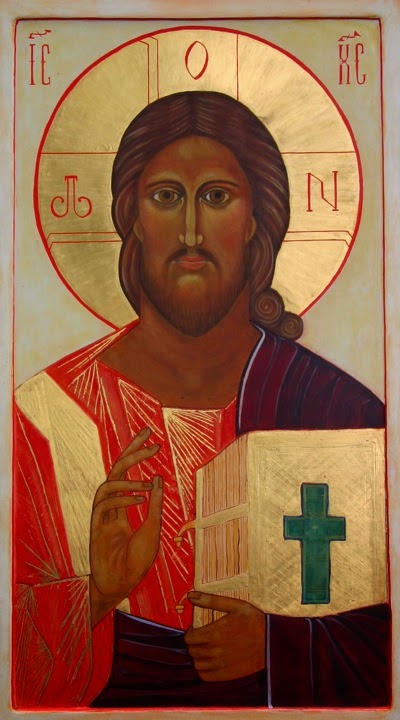June Trinity
John 11: 17-44
When Jesus got [to Bethany]
there, he found that he [Lazarus] had already been in the tomb for four days.
Bethany was near Jerusalem, about two miles away. Many Jews had come to Martha
and Mary to console them about their brother. When Martha heard that Jesus was
coming, she went to meet him. But Mary remained within. And Martha said to
Jesus, “Lord, if you had been here, my brother would not have died. But I know
that even now God will give you whatever you ask.
Jesus said to her, “Your brother will rise again.”
Martha answered, “I know that he will rise again in
the great resurrection at the end of time.”
Then Jesus said to her, “I AM the resurrection and
the life. Whoever fills himself with my power through faith, he will live even
when he dies; and whoever takes me into himself as his life, he is set free
from the might of death in all earthly cycles of time. Do you feel the truth of
these words?”
And she said, “Yes Lord. With my heart I have
recognized that you are the Christ, the Son of God, who is coming into the
world.”
When she had said this she went and called her
sister Mary and said to her privately, “The Master is here and is asking for
you.” Jesus had not yet entered the town. He had stayed in the place where Martha
had met him.
When the Jews who were with her in the house,
consoling her, saw Mary get up quickly and go out, they followed her. They
thought she was going to the tomb to weep there. But Mary came to the place
where Jesus was, and when she saw him, she fell at his feet and said to him,
“Lord, if you had been there, this brother of mine would not have died. “
They answered, “Come, Lord, and see.”
Jesus wept. Then the Jews said, “See how he loved
him.” But some of them said, “Could not he who restored the sight of the blind
man keep this man from dying?”
And again Jesus, deeply moved within himself went
up to the tomb.
It was a cave, and a stone lay across it. And Jesus
said, “Take away the stone!”
Then said Martha, the sister of him whose life had
reached completion, “Lord, there will be an odor [he has already begun to
decompose], for this is the fourth day.”
But Jesus said, “Did I not say to you that if you
had faith, you would see the revelation of God?”
Then they took away the stone. And Jesus lifted up
his eyes to the spirit and said, “Father, I thank you that you have heard me. I
knew that you always hear me; but because of the people standing here I say it,
so that their hearts may know that you have sent me. Then he called with a loud
voice: “Lazarus, come out!”
And the dead man came out, his feet and hands bound
with strips of linen, his face covered with a veil. And Jesus said, “Unbind
him, and let him go.”
5th June Trinity
John 11: 17-44
June 23, 2013
In today’s reading, Jesus interacts with the three
siblings, Martha, Mary and Lazarus. As one of them dies, each of them is
plunged into the depths of human experience. We can look at each of these
characters as archetypal parts of one human soul.
Martha is the active one; she goes out to meet Christ on
the way, because her heart has recognized Him as the Son of God. Then there is
Mary, the more inward side of the soul, sunk in contemplation and grief,
waiting. And there is Lazarus, the rich young man who had asked what he must do
to attain eternal life and who was told to follow the deep path of sacrifice. (Matthew
19:16, Luke 10:25) He has preceded Christ into the realm of death. After his
own death experience, he will be able to stand under the cross and as the
disciple John he will accompany Jesus’ death.
And finally there
is Christ Jesus himself, who is both compassionate and ultimately called upon
to draw on His deepest powers. Deeply stirred within, He pours out the power of
his Life, the power that overcomes death. And He calls Lazarus forth from the
grave, restoring him to Life. He is anticipating His own death, His own entombment,
His own rising from the grave.
Martha acts; Mary waits; Lazarus has surrendered. They
are all three images of what is necessary when the soul faces loss. We do what
we can; we wait; we surrender ourselves to the greater will of God. And Christ
comes. He takes away the stone that seals the grave of the heart in death. He
brings new Life. Often it is the unexpected. One poet says:
Sometimes things don't go, after all,
from bad to worse. ….
sometimes a man aims high, and all goes well.
from bad to worse. ….
sometimes a man aims high, and all goes well.
…Some men become what they were born for.
Sometimes our best efforts do not go
amiss; ….
amiss; ….
The sun will sometimes melt a field of sorrow
that seemed hard frozen: may it happen to you.[1]
that seemed hard frozen: may it happen to you.[1]



